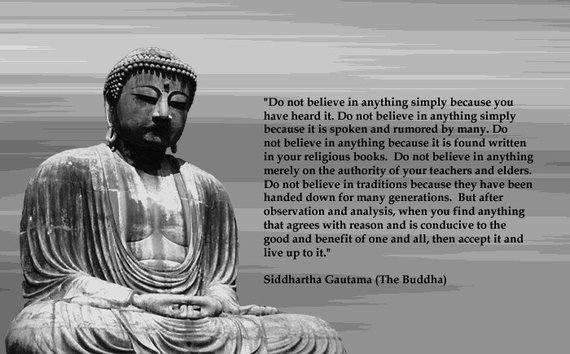I'm starting an alternative school -- and let's be sure to keep "school" in quotes if that word immediately makes you think of desks and tests and throwing apples at the teacher -- because the dominant high school and college systems are missing something. A lot of things, actually. But let's start with this one: religion. Hear me out, though.
Understanding what that word means, or has the potential to mean when it's not busy being recruited for dogmatic beliefs is essential. For now I'll shorten the issue by asking you to think of religion as the capacity to use your imagination in the service of wonder -- how to wonder about your life and how it might be lived with virtuosity in each and every changing moment. Way easier said than done. But to help the cause, religion can be a source of freedom and creativity rather than restriction -- freedom from habit, fear, and self-centeredness. Understanding religion in this way is far from easy because it's habitual for us to fall into either the literal fundamentalist ditch or the nihilistic one.
And yet, most people long for freedom, especially younger people who are still figuring out who they are and who they wish to become before they get caught in a life of inauthentic drudgery. They are pretty much starving to hear from anyone who has enough wisdom and perspective about how they got burned by life's fire and about how the young inquirers themselves might eventually skillfully roast some s'mores without causing a conflagration. Despite this desire for ethical and spiritual wisdom, high schools, and especially colleges, run as fast as they can from thinking about "the great matters of life and death." Our great books are to be close-read, theorized, deconstructed, intellectualized, and problematized, but never ought they be used as guides for the spirit. Maybe Huck Finn is the only exception for whatever reason.
So I call bullshit because we also read stories to better understand our own. It's what the humanities are for when they're allowed to be themselves, which, in the collegiate curriculum is hardly ever. And by the way, I'm not at all afraid of sitting by myself in faculty meetings.
David Brooks recently posted this op-ed in the New York Times about the decline of moral discourse in academe: "The Big University".
It's not a new idea. When thinking about the "why" for starting an alternative school, I thought quite often about this precursor essay -- "Colleges Should Teach Religion to Their Students" -- whose by-line is "When students feel adrift, spiritual guidance may help." I'm glad it said "when" not "if."
So anyway, here are some choice snippets from David Brooks's op-ed and my non-ironic responses:
Universities are more professional and glittering than ever, but in some ways there is emptiness deep down. Students are taught how to do things, but many are not forced to reflect on why they should do them or what we are here for. They are given many career options, but they are on their own when it comes to developing criteria to determine which vocation would lead to the fullest life.
Preach on, Brother Brooks!
If colleges are going to justify themselves, they are going to have to thrive at those things that require physical proximity. That includes moral and spiritual development. Very few of us cultivate our souls as hermits. We do it through small groups and relationships and in social contexts.
Amen! Now the proposed solution:
First, reveal moral options. We're the inheritors of an array of moral traditions. There's the Greek tradition emphasizing honor, glory and courage, the Jewish tradition emphasizing justice and law, the Christian tradition emphasizing surrender and grace, the scientific tradition emphasizing reason and logic, and so on.
Ah-ha! I knew there was something that needed tweaking. Par for a writer and thinker from the West, the Eastern traditions are not mentioned. Yes, "and so on" grants David Brooks technical impunity, but I just kinda knew that the least dogmatic and least metaphysical tradition dating from 500 years before Jesus would not be given stage time.
So one of my aspirations with The School of Life is to help introduce students to the teachings of a wise monk from ancient India and to see whether these teachings help satisfy their craving for wisdom and for a path of maturity and purpose.
This monk, the historical Buddha, never talked about life after death because he was too busy teaching us how to live on Earth and about the things we do know about. But now that I think of it, I don't see any reason to call these teachings religious -- I prefer the non-denominational word wise.
There's a real hunger out there, it's true. Let's not let belief systems and outdated school systems get in the way of nourishing our hunger for connection and for truly growing up. Let's commit to teaching wisdom.
